- Home
- Julia London
Hard-Hearted Highlander--A Historical Romance Novel
Hard-Hearted Highlander--A Historical Romance Novel Read online
An indomitable governess...a brooding Highlander...a forbidden affair...
An ill-fated elopement cost English-born governess Bernadette Holly her reputation, her unsuitable lover and any chance of a future match. She has nothing left to fear—not even the bitter, dangerously handsome Scot due to marry her young charge. Naive wallflower Avaline is terrified to wed Rabbie Mackenzie, but if he sends her home, she will be ruined. Bernadette’s solution: convince Rabbie to get Avaline to cry off...while ignoring her own traitorous attraction to him.
A forced engagement to an Englishwoman is a hard pill for any Scot to swallow. It’s even worse when the fiancée in question is a delicate, foolish young miss—unlike her spirited, quick-witted governess. Sparring with Bernadette brings passion and light back to Rabbie’s life after the failed Jacobite uprising. His clan’s future depends upon his match to another, but how can any Highlander forsake a love that stirs his heart and soul?
Praise for New York Times bestselling author Julia London
“Veteran author London entices readers.... Expert storytelling and believable characters make the romance between Arran and Margot come alive in this compelling novel packed with characters whom readers will be sad to leave behind.”
—Publishers Weekly on Wild Wicked Scot (starred review)
“London’s writing bubbles with high emotion... Her blend of playful humor and sincerity imbues her heroines with incredible appeal, and readers will delight as their unconventional tactics create rambling paths to happiness.”
—Publishers Weekly on The Devil Takes a Bride (starred review)
“This tale of scandal and passion is perfect for readers who like to see bad girls win, but still love the feeling of a society romance, and London nicely sets up future books starring Honor’s sisters.”
—Publishers Weekly on The Trouble with Honor
“The complexity of the relationship between Daisy and Cailean sets this novel apart from many in its genre.”
—Publishers Weekly on Sinful Scottish Laird
“Julia London writes vibrant, emotional stories and sexy, richly drawn characters.”
—New York Times bestselling author Madeline Hunter
Also available from Julia London
and HQN Books
The Cabot Sisters
The Trouble with Honor
The Devil Takes a Bride
The Scoundrel and the Debutante
The Highland Grooms
Wild Wicked Scot
Sinful Scottish Laird
Hard-Hearted Highlander
Julia London
Hard-Hearted Highlander
To the Scottish Highlands, fueling the fantasies of readers for hundreds of years.
Contents
CHAPTER ONE
CHAPTER TWO
CHAPTER THREE
CHAPTER FOUR
CHAPTER FIVE
CHAPTER SIX
CHAPTER SEVEN
CHAPTER EIGHT
CHAPTER NINE
CHAPTER TEN
CHAPTER ELEVEN
CHAPTER TWELVE
CHAPTER THIRTEEN
CHAPTER FOURTEEN
CHAPTER FIFTEEN
CHAPTER SIXTEEN
CHAPTER SEVENTEEN
CHAPTER EIGHTEEN
CHAPTER NINETEEN
CHAPTER TWENTY
CHAPTER TWENTY-ONE
CHAPTER TWENTY-TWO
CHAPTER TWENTY-THREE
CHAPTER TWENTY-FOUR
EPILOGUE
EXCERPT FROM WILD WICKED SCOT BY JULIA LONDON
CHAPTER ONE
The Scottish Highlands, 1750
HE STOOD ON the very edge of the cliff, the tips of his boots just over the crusty rim, nothing below them but air. It was quite a long way down—one strong gust of wind would do it.
He wondered how it would feel to fall. Would his body soar like the seabirds that leaped from the edge of the cliffs to glide above the surface of the water? Or would he fall like a rock come loose from the edge? Would he be alive when he crashed into the water? Or would his heart desert him well before that final moment?
No matter how he fell, Rabbie Mackenzie knew he’d be dead the moment he hit the water and was impaled on the rocks that lurked just beneath the froth. Likely, he’d feel nothing. The water would recede and carry his body out to sea like so much detritus.
He watched the waves crashing against the wall of the cliff as the tide rose, spellbound by the violence of them. It was true that he wished himself dead, but it was also true that he’d not found the courage to die. It was the height of irony—what he wished, what he longed for, was the Highlands of his youth, when Highland men were not afraid to die.
And yet, here he stood, afraid to die.
Rabbie wished for the prosperity of those years before the battle between the Scots and the English on the moors near Culloden, for plaids and the armaments of a mighty clan, now all of it outlawed. He wished for the feills, where he once measured his strength against men in rousing contests, and for the bonny lasses who carried ale to quench the men’s thirst. Those Highlands were gone. It was a wasteland now, entire settlements burned by the English, the people either hanged or dispersed to lands across the sea. Farmland stood empty. Cattle and sheep had been rounded up and sold. The land was devoid of color and life.
Even Balhaire, the seat of the Mackenzie clan for centuries, had not gone unscathed. They had kept apart from the Jacobites, the rebels who wanted to restore Charlie Stuart to the throne. The Mackenzies had let it be known to all Highlanders they wanted no part in the rebellion. Even so, after so many Highland clans had seen their men slaughtered on the moors of Culloden by English forces, half the Mackenzie clan had been chased away by fear and false accusations. Rabbie himself had been forced to flee, hiding away in Norway for a little more than two years like a bloody coward.
Aye, he’d been sympathetic to the rebel cause, but he’d not taken up arms. He held no love for the English, no matter that his mother was a foreigner, a Sassenach, and his brother’s wife an English viscountess. Rabbie had agreed with Seona’s family—that Scotland would be drowned under the weight of taxes and excises as long as George ruled them.
He’d agreed with it, but he’d not spoken publicly against the crown. They’d come looking for him all the same, had burned more than half the village about Balhaire before the flames could be doused, had seized their cattle and laid waste to their farms.
Aye, Rabbie longed for the days of his youth.
He also longed to know what had happened to Seona. Was she dead? Was it somehow possible she was still alive? He would never know.
A movement at the entrance of the cove caught his eye. The prow of a ship was emerging, bobbing up and down in the waves as the captain negotiated the granite wall and the rocky entrance to their hidden shelter.
That would be his brother, Aulay, just returned from England.
Rabbie looked down at the water once more, wishing for a gust of wind to make the decision for him. He watched a bit of seaweed ride out from the rocks and into the center of the cove, and then, with the next wave, disappear altogether.
He stepped back from the edge. He’d not jump today. Today, he would meet his intended bride.
* * *
RABBIE TRUD
GED WEARILY up the high road of what had once been a bustling village surrounding the fortress of Balhaire. Many of the shop fronts were shuttered, and with the exception of a smithy and an inn that also served somewhat as a dry goods shop, there was hardly any commerce to be had.
He walked through the massive gates and into the bailey of the old castle fortress, Balhaire. No one but a few men were about. Even many of the dogs that had once roamed this bailey had left for places unknown. He carried on, into the old castle, past walls stripped of their historic armaments, save those they’d managed to hide away.
His boots echoed on the stone floor as he made his way to the study where he’d find the laird, his father, the head of what was left of Clan Mackenzie. He was inside, as Rabbie knew he’d be, his brow furrowed as he studied a ledger at his desk. He was still quite robust in spite of a bad leg. His hair had been turned to silver by the events of the last few years.
His father didn’t notice him at the open door. “Feasgar math, Athair. Ciamar a tha thu?” Rabbie said in greeting.
“Rabbie, lad, come in, then,” his father said, waving him in. “I am well, very well.” He removed his spectacles and rubbed his eyes. “We missed you at breakfast this morning.” He repositioned his spectacles and glanced at his youngest son. “Where might you have gone, then?”
Rabbie shrugged. “I walked.”
His father looked as if he wanted to say more, but did not. Rabbie was aware that his family worried about his state of mind. He worried about it, too. He’d tried to hide his restlessness from them, but it was no use—a man could not create a pleasant mien out of thin air, could he?
He walked to the sideboard and poured a dram of whisky, which he tossed back before holding up the container to his father with a questioning look. His father shook his head. His gaze fell to the container, apparently waiting for Rabbie to put it aside.
Rabbie didn’t put it aside—he poured more. “The ship has come,” he said. It wasn’t necessary to say which ship—they’d lost one of their fleet of two to England and now relied on the oldest ship. They’d been expecting Aulay for a day or two now.
“Good,” his father said. “I donna like my second son in England any more than I like my first there.”
He was referring to Cailean, who had married Lady Chatwick. They resided at the northern estate of Chatwick Hall, away from politics and trouble...except that a Scot was never far from trouble in England.
His father didn’t mention the bridal party. Rabbie drank a second dram of whisky, felt the warmth of it cut through the clawing in his throat. His drinking had been a source of contention between him and his mother of late, and for good reason. In addition to battling his dark thoughts, Rabbie was also drinking too much. He just couldn’t seem to help himself on either front.
He walked to the window and away from the temptation to drown his despair in whisky, and stared down at the empty bailey. “It’s decided then, is it?”
“What is?” his father asked.
His father knew very well what he meant, and a moment later he sighed, as if he was weary of discussing it. “I’ve said it before, lad, I’ll say it again. You must be the one to decide—I canna make the decision for you, aye?”
But hadn’t he made the decision for him? Hadn’t the decision been made the first time his father and mother approached him?
“Have you changed your mind, then?” his father asked.
Rabbie laughed with no small amount of derision. “Changed my mind? What, and leave Balhaire unprotected? Allow them to come in and dismantle it completely?” He shook his head. “No, Athair, I’ve no’ changed my mind. I’ll do as I must, I will.”
“It’s no’ ideal, no,” his father said.
A blatant understatement.
“Cailean has said she is bonny,” his father suggested. “That eases you a wee bit, aye?”
No, that pained Rabbie most of all. No one was as bonny to him as Seona MacBee had been, she with the dark red hair and deep brown eyes. A Diah, why hadn’t he married Seona before the war? If he had, she’d have fled to Norway with him. She’d be alive.
A sharp pain sliced behind his eyes and Rabbie squeezed them shut. “As if that matters to me now,” he muttered.
“Rabbie,” his father said. Rabbie could hear him coming to his feet, the labored drag of his bad leg and cane across the floor until he reached his son. He put his hand on Rabbie’s shoulder. “The lass is young. She’ll bend to your will, she will. She’ll become what you want of her.”
What Rabbie wanted of her was to become Seona, and that was impossible.
“See here,” his father said quietly. “Marry the lass. Put her in your marital bed and then take a mistress.”
Surprised, Rabbie turned to look at his father.
“Spend your time at Balhaire, or send her to England for long summers. You need no’ lock yourself away with her at Arrandale.” At Rabbie’s baffled look, Arran Mackenzie merely shrugged. “Desperate times demand desperate measures, do they no’? This is no’ what your mother and I want for you. Unfortunately, we’ve no other options. If there was an Englishman in want of a Highland wife—”
Rabbie instantly shook his head. It is one thing for him to marry into an English family, but he would never wish that on his free-spirited younger sister, Catriona. “No,” he said firmly. “It must be me, aye?”
“No’ if you donna want it.”
“I donna want it,” Rabbie said. “But I’ll no’ leave Balhaire without hope.”
His father smiled sadly, patted Rabbie’s shoulder and then, leaning heavily on his cane, started for the door. “Then we’ll seal the betrothal tonight.” He paused in his trek across the study and glanced back. “Unless you say the word, lad. You need only say it.”
There was no word Rabbie could say—he was trapped like a mouse behind a door with a cat waiting on the other side, no way out but death. If he didn’t marry this woman, her father, who had bought Killeaven from the crown after the Somerleds had deserted it, would buy up lands around Balhaire, including those that had been abandoned by Mackenzies that had fled. Lands his family could not afford to purchase from the crown, not with their sea trade cut in half, their smuggling brought to a halt by war and the fact that there was no one left to buy their goods.
If the land around Balhaire was bought, and sheep installed, there would not be enough land to sustain the Mackenzies that were left. No land for food, no land for livestock. They were struggling to rebuild after the rebellion and the destruction it had wrought across the Highlands. If Rabbie took this Sassenach girl to wife, and Killeaven with her, the Mackenzies could at least control the erosion of their livelihood.
He truly had no choice.
* * *
THE BRIDAL PARTY had arrived with quite a lot of commotion. Sixteen in all, Frang, the butler, said—servants, the girl’s parents, an uncle, he thought. And a governess.
“A governess,” Rabbie repeated disdainfully. “Is the lass no’ seventeen years of age? Is she still in need of a governess?”
“Not a governess, precisely,” his mother said, patting his arm. “I’d venture she is a governess turned lady’s maid for lack of a better occupation.”
“What, then, am I to feed her, too?”
His mother frowned and managed to look elegant while doing it, a feat that he’d never seen matched in another woman.
Rabbie and his parents were in the great hall. They’d taken their places on the old dais above the tables, where Mackenzie lairds and their families had sat for two centuries. They could hear the arrival of the Sassenach, could hear the voices chattering merrily at the entrance. They watched silently as Aulay led the English contingent into the hall.
At the head of the Sassenach party was a tall, slender man with a face powdered as white as snow and who, judging by his dress, was
the Baron Kent. He paused to glance around, his expression one of amazement, as if he’d never seen the inside of a castle. When Cailean and his wife, Daisy, had come a few months ago with the news of their discussions with Baron Kent, Daisy reported that Bothing, the Kent home, was quite grand. “Three stories tall, with long wings,” she’d said. “Grander than Chatwick Hall.”
Rabbie had never seen Chatwick Hall, but he’d noted the way Daisy’s eyes had widened and had supposed the Bothing place must be very grand indeed. Perhaps Balhaire was more rustic than what he’d anticipated. He wondered what the baron might expect of Killeaven, the estate he’d purchased sight unseen.
Aulay walked briskly to the dais ahead of the group. His blond hair had grown too long, and the sun had browned his face after so many days at sea. He looked leaner than the last time Rabbie had seen him. He swept his hat off his head and bowed to his parents, then spoke in Gaelic, greeting them both, and then Rabbie.
“So then,” his father responded in Gaelic. “How do you find them?”
“No trouble,” Aulay said with a shrug, and looked at Rabbie. “The lass is meek.”
Rabbie said nothing. He didn’t want a meek lass. If he had to do this, he wanted a woman. He looked to the group for a glimpse of the lass in question, but the only woman he noticed in that gaggle of Sassenach was one standing slightly apart from the group, leaning insouciantly against the wall. She was tall, dark-haired and plainly dressed. She’d crossed her arms across her middle and her gaze was fixed on the hound sniffing around her hem. She looked a wee bit as if she was inconvenienced, which he thought was rather odd. If anyone here was inconvenienced, it was certainly not she.
Rabbie’s father stood. “My lord, Ceud mile failte—welcome to Balhaire.”
“Bit of an unusual place you have here,” the man who looked like a ghost said as he strolled forward. Behind him, another man waddled after him like a fatted pig. Both of their wigs were ridiculous. “How good of you to receive us. I understand Killeaven is a bit of a drive yet from here?”

 A Royal Kiss & Tell
A Royal Kiss & Tell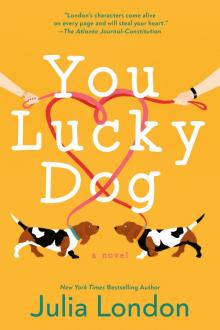 You Lucky Dog
You Lucky Dog The Devil in the Saddle
The Devil in the Saddle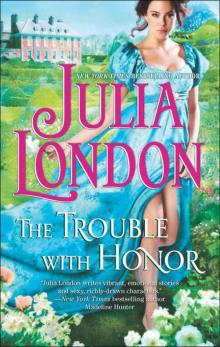 The Trouble with Honor
The Trouble with Honor Tempting the Laird
Tempting the Laird The Secret Lover
The Secret Lover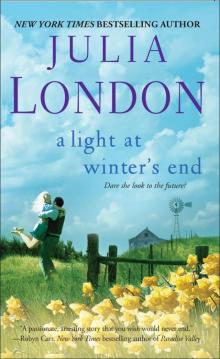 A Light at Winter’s End
A Light at Winter’s End The Charmer in Chaps
The Charmer in Chaps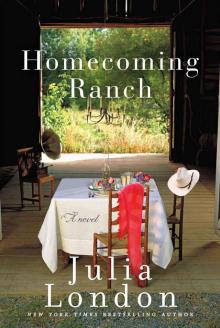 Homecoming Ranch
Homecoming Ranch Jack (7 Brides for 7 Soldiers Book 5)
Jack (7 Brides for 7 Soldiers Book 5) A Courtesan's Scandal
A Courtesan's Scandal Hard-Hearted Highlander--A Historical Romance Novel
Hard-Hearted Highlander--A Historical Romance Novel The Complete Novels of the Lear Sister Trilogy
The Complete Novels of the Lear Sister Trilogy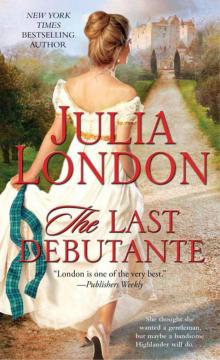 The Last Debutante
The Last Debutante Suddenly Single (A Lake Haven Novel Book 4)
Suddenly Single (A Lake Haven Novel Book 4) Seduced by a Scot
Seduced by a Scot Highlander Unbound
Highlander Unbound Suddenly Dating (A Lake Haven Novel Book 2)
Suddenly Dating (A Lake Haven Novel Book 2) The Bridesmaid
The Bridesmaid The Seduction of Lady X
The Seduction of Lady X One Mad Night
One Mad Night Extreme Bachelor
Extreme Bachelor The Scoundrel and the Debutante
The Scoundrel and the Debutante The Revenge of Lord Eberlin
The Revenge of Lord Eberlin American Diva
American Diva The Lovers: A Ghost Story
The Lovers: A Ghost Story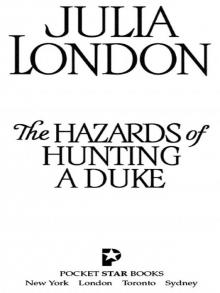 The Hazards of Hunting a Duke
The Hazards of Hunting a Duke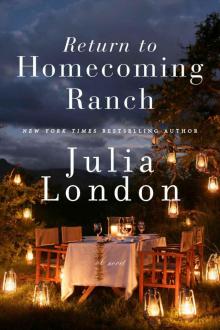 Return to Homecoming Ranch (Pine River)
Return to Homecoming Ranch (Pine River)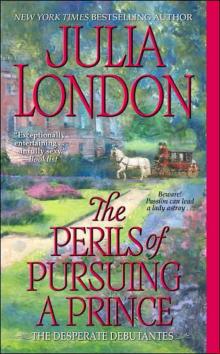 The Perils of Pursuing a Prince
The Perils of Pursuing a Prince Highlander in Love
Highlander in Love The Devil Takes a Bride
The Devil Takes a Bride Devil in Tartan
Devil in Tartan Wild Wicked Scot
Wild Wicked Scot Snowy Night with a Highlander
Snowy Night with a Highlander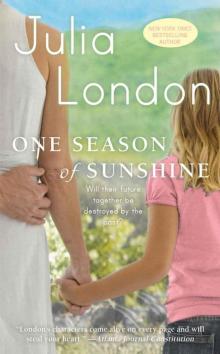 One Season of Sunshine
One Season of Sunshine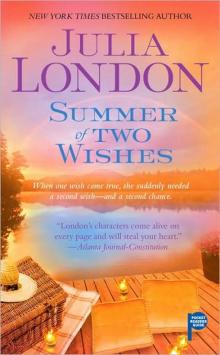 Summer of Two Wishes
Summer of Two Wishes All I Need Is You aka Wedding Survivor
All I Need Is You aka Wedding Survivor Sinful Scottish Laird--A Historical Romance Novel
Sinful Scottish Laird--A Historical Romance Novel Suddenly Engaged (A Lake Haven Novel Book 3)
Suddenly Engaged (A Lake Haven Novel Book 3) Highlander in Disguise
Highlander in Disguise Suddenly in Love (Lake Haven#1)
Suddenly in Love (Lake Haven#1)